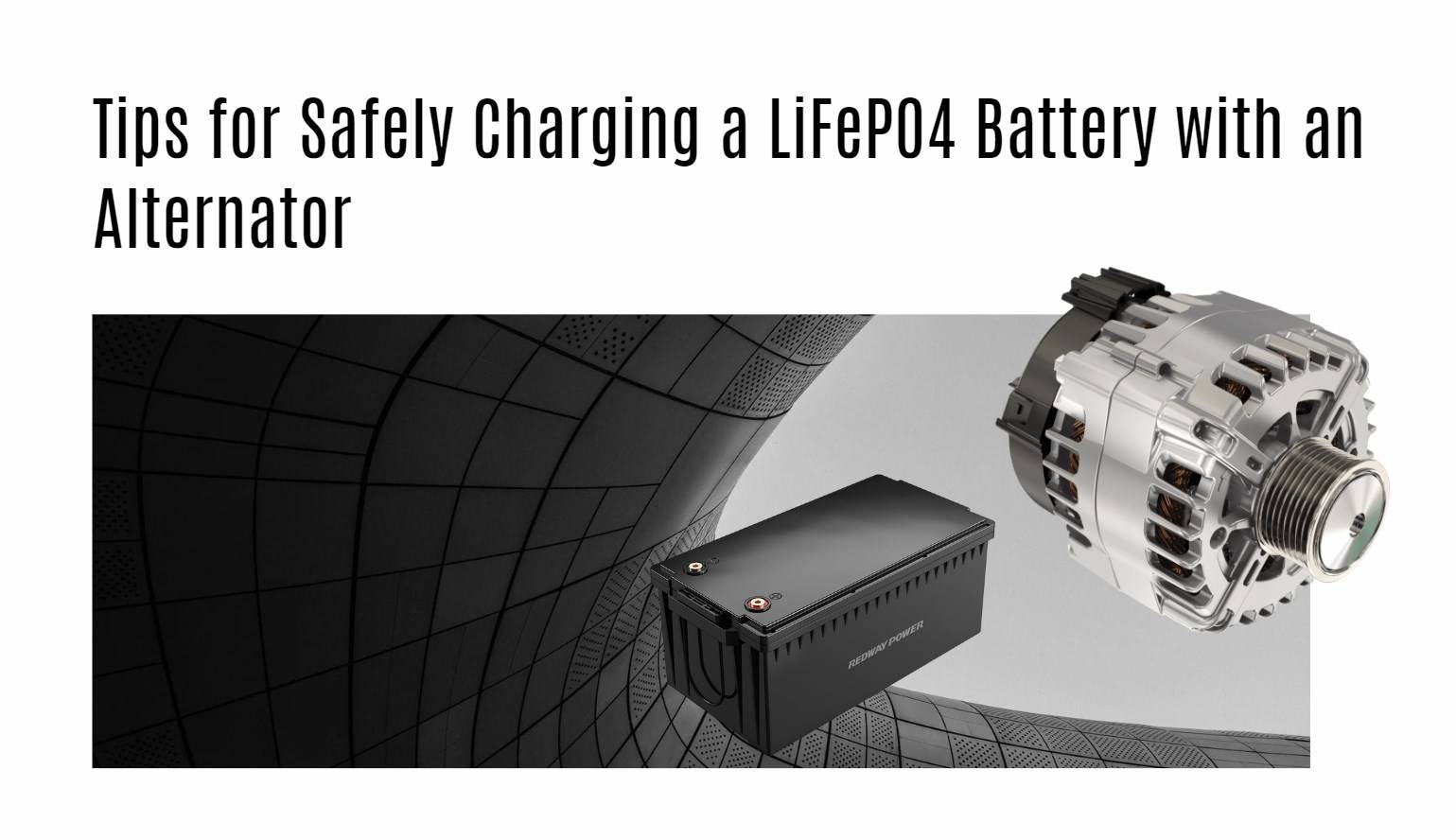To safely charge a LiFePO4 battery with an alternator, use a DC-DC charger as a go-between to convert the alternator’s output to the proper charge profile. Consider using a Battery Management System (BMS) to monitor and regulate the charging process. Always follow the manufacturer’s guidelines for optimal charging and to prevent damage to the battery and alternator.
-
Use a DC-DC Charger:
Charging a LiFePO4 battery directly from an alternator is not recommended due to the differences in charging profiles. To safely charge the battery, a DC-DC charger acts as an intermediary device. It converts the output of the alternator to the proper charge profile required by LiFePO4 batteries, ensuring safe and efficient charging. -
Consider a Battery Management System (BMS):
A BMS plays a vital role in charging LiFePO4 batteries safely. It monitors and regulates the charging process, preventing overcharging, over-discharging, and other potential issues. The BMS ensures that the battery is charged within its safe voltage and current limits, maximizing its lifespan and performance. -
Follow Manufacturer Guidelines:
To ensure optimal charging and prevent damage, it’s crucial to follow the manufacturer’s guidelines and recommendations for charging LiFePO4 batteries. Each battery may have specific requirements and limitations that need to be considered. Adhering to these guidelines helps maintain the battery’s health and longevity.
Table of Contents
ToggleUnderstanding the Differences Between Lithium-Ion and Lead-Acid Batteries
Discover the key differences between lithium-ion and lead-acid batteries. Lithium-ion batteries offer higher energy density, longer lifespan, and lighter weight, making them ideal for portable electronics and electric vehicles. Lead-acid batteries are cost-effective, robust, and can deliver high current, making them suitable for applications such as backup power systems and automotive starting.
-
Lithium-Ion Batteries:
- Lithium-ion batteries offer higher energy density compared to lead-acid batteries. This means they can store more energy in a smaller and lighter package.
- They also have a longer lifespan, allowing for more charge and discharge cycles before significant capacity degradation occurs.
- Lithium-ion batteries are commonly used in portable electronics, electric vehicles, and renewable energy storage systems.
-
Lead-Acid Batteries:
- Lead-acid batteries are known for their cost-effectiveness and robustness. They have been widely used for many years.
- They have the ability to deliver high current, making them suitable for applications such as automotive starting and backup power systems.
- Lead-acid batteries are relatively heavier and bulkier compared to lithium-ion batteries.
The Potential Dangers of Charging LiFePO4 Batteries with an Alternator
Learn about the potential dangers of charging LiFePO4 batteries with an alternator. Alternators are designed for lead-acid batteries and may not provide the correct charging profile for LiFePO4 batteries. Improper charging can lead to overcharging, thermal runaway, and damage to the LiFePO4 batteries. Follow recommended charging methods to ensure safe and efficient charging.
-
Incompatibility with Alternator Charging:
- Alternators are primarily designed to charge lead-acid batteries, which have different charging requirements compared to LiFePO4 batteries.
- The charging profile provided by an alternator may not be suitable for LiFePO4 batteries, potentially leading to overcharging.
-
Risks of Overcharging:
- Overcharging LiFePO4 batteries can result in thermal runaway, where the battery temperature increases uncontrollably.
- Thermal runaway can cause damage to the LiFePO4 batteries, reduce their capacity, and even pose safety hazards.
-
Recommended Charging Methods:
- To ensure safe and efficient charging of LiFePO4 batteries, it is recommended to use dedicated LiFePO4 battery chargers that provide the correct charging profile.
- These chargers are designed specifically for LiFePO4 batteries and offer the necessary voltage and current settings for optimal charging.
Tips for Safely Charging a LiFePO4 Battery with an Alternator
Discover essential tips for safely charging a LiFePO4 battery with an alternator. Ensure that the alternator’s charging voltage is compatible with LiFePO4 batteries. Use a reliable battery management system to monitor and regulate the charging process. Following these tips will help maintain the safety and performance of LiFePO4 batteries when charging with an alternator.
-
Check Voltage Compatibility:
- LiFePO4 batteries have specific voltage requirements for charging. It is crucial to ensure that the alternator’s charging voltage is within the acceptable range for LiFePO4 batteries.
- Using a voltage regulator or a compatible alternator that provides the correct charging voltage is essential to prevent overcharging or undercharging.
-
Utilize a Battery Management System (BMS):
- A battery management system is a crucial component when charging LiFePO4 batteries with an alternator.
- A reliable BMS monitors and regulates the charging process, ensuring that the battery is charged within safe limits and protecting it from potential risks such as overcharging or overheating.
-
Regularly Monitor Charging Process:
- It is important to regularly monitor the charging process when charging a LiFePO4 battery with an alternator.
- Keep an eye on the battery’s voltage, temperature, and charging current to ensure everything remains within the recommended range.
- If any abnormalities are observed, such as excessive heat or voltage fluctuations, take immediate action to prevent potential damage to the battery.
Alternative Charging Methods for LiFePO4 Batteries
Explore alternative charging methods for LiFePO4 batteries. Dedicated LiFePO4 battery chargers offer precise charging profiles. Solar panels provide a renewable energy source for charging in outdoor settings. AC power sources offer convenient charging options. Choose the method that best suits your needs and ensures safe and efficient charging of LiFePO4 batteries.
-
Dedicated LiFePO4 Battery Chargers:
- Dedicated LiFePO4 battery chargers are designed specifically for these batteries, offering precise charging profiles.
- These chargers ensure that the LiFePO4 batteries are charged within the optimal voltage and current ranges, maximizing their performance and lifespan.
-
Solar Panels:
- Solar panels provide a renewable energy source for charging LiFePO4 batteries, especially in outdoor settings.
- They harness sunlight and convert it into electricity, which can be used to charge the batteries, making it an environmentally friendly option.
-
AC Power Sources:
- AC power sources, such as wall outlets or generators, offer convenient charging options for LiFePO4 batteries.
- Using a compatible AC charger ensures that the batteries are charged safely and efficiently.









